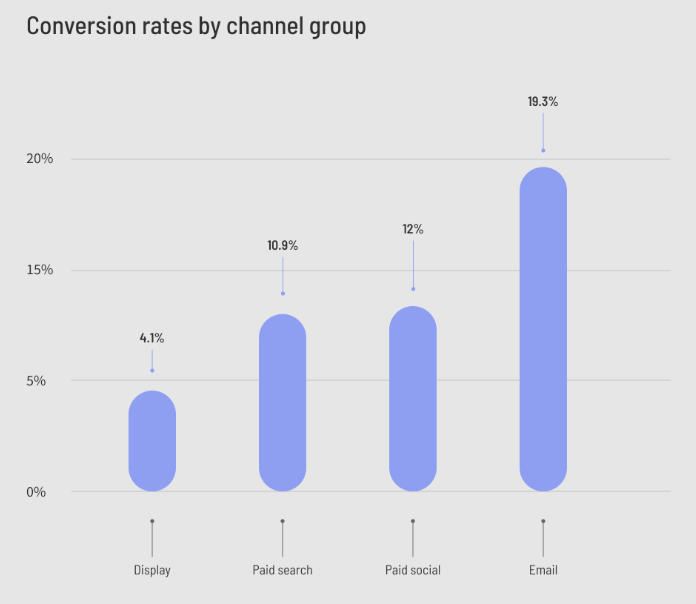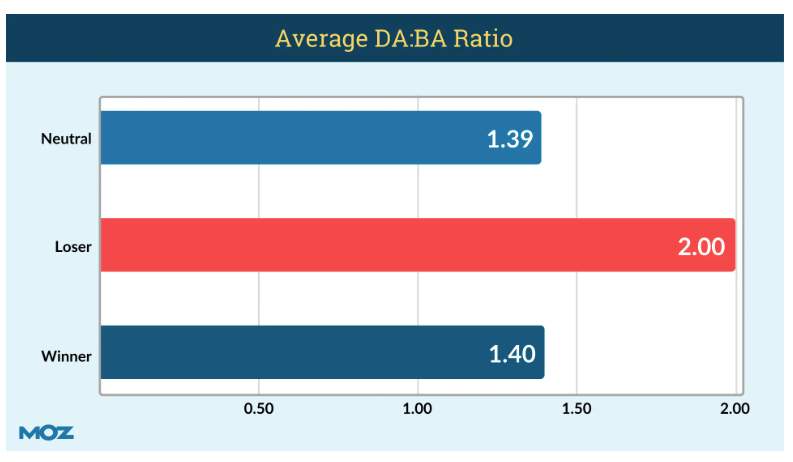Conversion Benchmarks, Brand Demand, 'Illegal' AI Summaries

Conversions: Email Still Kicks Ass
Unbounce has released its latest Conversion Benchmarking Report (form required). The study contains data from 57 million conversions and 41 thousand landing pages. The median conversion rate across the dataset is 6.6%, which varies by industry between 3.8% to 12.3%. The highest converting industry is entertainment; the lowest is SaaS:
- Events and entertainment - 12.3%
- Education - 8.4%
- Financial services - 8.3%
- Legal - 6.3%
- Commercial and professional services - 6.1%
- Health and wellness - 5.1%
- Travel and hospitality - 4.8%
- Ecommerce - 4.2%
- SaaS - 3.8%
Email is by far the highest converting channel (19.3%); display advertising is the lowest at 4.1%. Paid social converts somewhat better than paid search, according to the report (see chart below). But Google converts much better than Bing and Yahoo, which bring the average down. Instagram is the best performing social channel (17.9%), Facebook follows (13%) and then Twitter, YouTube, TikTok in that order (9% to 6.4%). Finally, the report advocates dumbing down your content and copy. Depressingly, the study says, "Writing at a 5th to 7th grade level can significantly boost your conversion rates," which converts twice as well as "professional-level writing."

Our take:
- Alas, there was no data or discussion of local landing pages. But here are some: SEL, Moz, Wiideman Consulting.
- Email continues to be a critical channel to invest in, for numerous reasons, even though it's mature.
- Despite the overload of promotional email it still outperforms all other channels, especially for e-commerce where conversions are 10 points higher.
HCU: Demand for Your Brand
We've talked recently about the importance of building a strong brand for ranking purposes, and devoted a podcast episode with Wix's Mordy Oberstein to the topic. I wasn't going to write about it again so soon but several items prompt it. On the local front there's Miriam Ellis' excellent article "Everything That Can Go Right and Wrong with Your Local Business Name." This is not explicitly about branding but indirectly it is. Also, Glen Allsopp of Detailed examines media brands vs. independent publishers in Google's Top Stories module. In an analysis of 45 million keywords, he finds that large media brands overwhelmingly dominate, although there is some hope for independent sites in the study. Most striking perhaps are the findings of a Tom Capper analysis of winners and losers in the Helpful Content Update (HCU). The study looks at HCU outcomes through the lens of domain vs. brand authority. Capper argues, "HCU was about the demand for your brand." He asserts that the HCU penalized sites where the brand and domain authority profiles were out of sync – strong link profiles without strong brand recognition. Capper also points to an older Google patent that uses branded queries as a ranking factor (see also, Navboost re behavioral signals).

Our take:
- Capper's theory that HCU penalized sites that had more links than their brands perhaps deserved is interesting. The practical advice is: keep going, make helpful content. But you've also got to build your brand (off Google).
- Brand is not directly a ranking signal. But users communicate their affinity for brands, which Google tracks.
- Users tend to click on brands and search for brands because they're better known. This creates a feedback loop that Google responds to and rewards.
Are AI Summaries Illegal?
Democratic Senators have called on US Assistant Attorney General Jonathan Kanter and FTC Chair Lina Khan to investigate whether generative AI and AI summaries (e.g., AI Overviews) violate US competition laws. They argue essentially that AI summaries misappropriate content from publishers, denying them clicks and potential revenue so that the "gatekeeper" (e.g., Google, Facebook) can capture the ad revenue itself. "[A]n AI-generated summary keeps the users on the original search platform, where that platform alone can profit from the user’s attention through advertising and data collection." The Senators acknowledge the presence of links in AI summaries but say they're "hidden behind tabs or at the bottom of a page where users are unlikely to scroll after already reading an answer." The upshot is that content creators are effectively competing "against themselves without any recourse to profit from AI-generated content that was composed using their original content." This is just a request, not an official investigation, but the effort to preempt or regulate AI summaries could threaten Google's future ability to compete.

Our take:
- There is some evidence that links in AI summaries do drive traffic but there's more evidence that "SERP features" generally (AIOs are one) harm CTRs.
- We're likely to see a version of this argument take flight in Europe. The European Court of Justice found this week that SERP features favoring Google content are anticompetitive. This has sweeping implications.
- It's interesting that copyright is not explicitly mentioned. But more striking is the attack (both in the US and Europe) on Google's control over the SERP.
Recent Analysis
- Near Memo episode 173: (From the Vault) The Google Review Fraud Landscape in Maps & LSA and How a Business Should Respond.
- Google and Booking: The Symbiotic Gatekeeper Relationship in European Hotel Search, by David Mihm.
Short Takes
- Local SEO not seen as "difficult" in SEO survey.
- The local ranking power of GBP secondary categories.
- LSA reverification process rolling out in legal vertical.
- Some evidence August Core Update now hitting SMBs.
- Bing Local Pack tests favicons for review sources rather than stars.
- NotebookLM can now create an AI conversation from sources.
- Google co-founder Brin working on AI "everyday."
- TikTok search consistently delivers misinformation.
- Google AI will decide whether people should get unemployment.
- Google to link to Wayback Machine to show earlier versions of sites.
- Google trial: News Corp. exec testifies re publisher ad dependence.
- Amazon bringing ads to AI shopping assistant Rufus.
Listen to our latest podcast.

How can we make this better? Email us with suggestions and recommendations.

